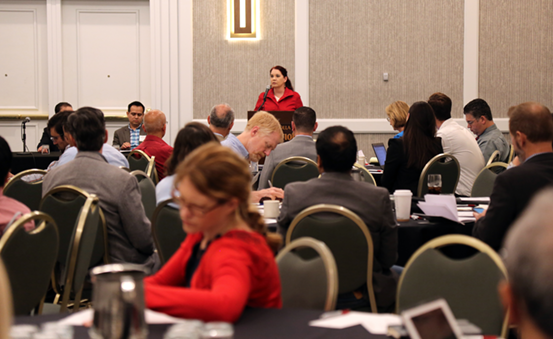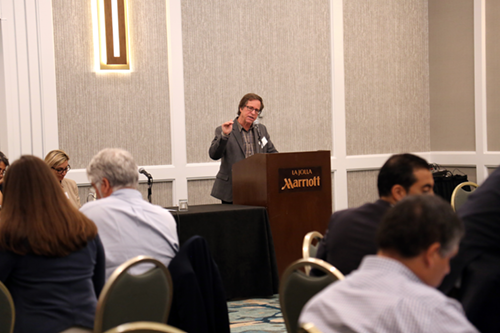New Border Solutions Alliance Holds First Workshop in San Diego
July 8, 2019
According to the U.S. Department of Transportation’s Bureau of Transportation Statistics, in 2018 more than 192 million people crossed the U.S.-Mexico border at one of the 17 ports of entry. More than 83 million buses, cars and trains crossed the border, and more than 6 million shipping containers also made the journey. While it’s easy to see how busy the border is, it’s much more complicated to address the challenges in border communities related to health, energy, infrastructure, environment, productivity and the movement of goods and people.
On June 5-7, 2019, UC San Diego hosted the first workshop of the “Border Solutions Alliance: Smart and Connected Communities.” The workshop, sponsored by the National Science Foundation, brought together a diverse array of experts from both the U.S. and Mexico. Over three days, they discussed problems and solutions to critical issues facing communities on both sides of the border. Additional workshops were held the following week in El Paso, Texas and Las Cruces, New Mexico.
The first day of the workshop included panel discussions focused on the topics of advanced manufacturing and digital services, intelligent mobility, and urban-rural resilience. Opening remarks were given by UC San Diego Vice Chancellor for Research Sandra Brown, who believed these workshops would “foster innovation, creativity, and new ways to collaborate to address real problems, experienced by real people, with real needs.”

A transversal theme of the workshop was the importance of developing a cross-border STEM talent pipeline. In discussing advanced manufacturing, Olivia Graeve, director of UC San Diego’s CaliBaja Center for Resilient Materials and Systems noted, “We really have to think about workforce development as a binational concept. It cannot be just R&D on the U.S. side and manufacturing on the Mexico side.”
The second day of the workshop took place in Tijuana at the Universidad Autónoma de Baja California. Faculty members from participating universities, along with leaders from government agencies, nonprofit organizations and industry, worked together in breakout sessions to identify bold ideas for new research initiatives centered on border mobility, advanced manufacturing and supply chains, and urban-rural resilience. The group spent the afternoon at Thermo Fisher Scientific, learning about ongoing initiatives in the region to develop the STEM talent pipeline through collaboration between academic institutions and industry.

The last day of the workshop brought everyone back to La Jolla to discuss proposals for new initiatives and next steps. For example, the urban-rural resilience breakout group identified the challenge of accurately modeling the impact of policy changes on the working and natural lands in the San Diego-Tijuana bioregion. UC San Diego Director of Urban Studies and Planning Keith Pezzoli said the solution might lie in creating a “digital twin,” which would use real-time data to create a virtual representation of a bioregion that allows for accurate projections.
Following the San Diego workshop, a second workshop was held in El Paso that focused on a different set of critical issues facing all border states. The El Paso breakout sessions focused on health and disaster management. In Las Cruces, breakout sessions were held on water resource management, including transboundary aquifers, watersheds, water decontamination and desalinization.
The workshops offered an unprecedented venue for experts in science, engineering, technology, and social and behavioral sciences to work with government and industry officials and tackle substantive, real-world problems that, when addressed, can have a lasting impact on quality of life, economic competitiveness and job creation.
The culmination of the Border Alliance project will be to present findings to policymakers, congressional staff and elected officials from the U.S. and Mexico, as well as relevant program officials from federal agencies and foundations in February 2020 during a convocation in Washington D.C. These findings will outline the requirements needed to address binational border issues and highlight economic development opportunities that exist in the border region with a goal of taking actionable steps. With this group of experts working together, a more efficient, more prosperous, safer and healthier border may be on the horizon.
The Border Solutions Alliance is a collaboration between University of California San Diego, University of Arizona, New Mexico State University, University of Texas at El Paso, University of Texas at San Antonio, Universidad Autónoma de Baja California, El Colegio de la Frontera Norte, El Colegio de Sonora and Universidad Autónoma de Cuidad Juárez.
The workshops were funded by the National Science Foundation (NSF) and supported by NSF Program Director David Corman, who recognized the unique test bed the border communities offer in the context of smart and connected communities. The goal is that the solutions created and implemented through this alliance will have far-reaching and sustainable impact on borders around the world or even between U.S. states.